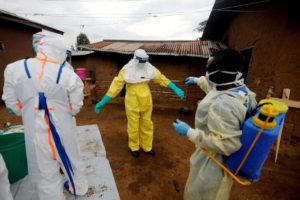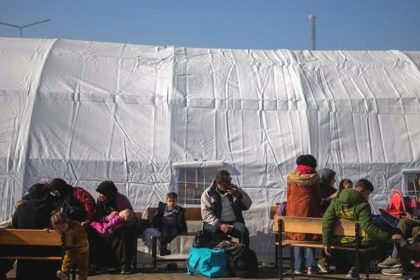
By Adeyemi Adekunle
The quiet corridors of Mulago National Referral Hospital, usually a place of healing, have become the epicenter of fear after a male nurse’s death confirmed the return of Ebola to Uganda’s capital.
What started as a fever quickly spiraled into a public health emergency, sending shockwaves through the city and beyond.
The deceased nurse, a dedicated frontline worker, had spent his final days unknowingly battling the deadly virus. Seeking relief, he moved between healthcare facilities and even turned to a traditional healer before succumbing to the illness on January 29. By the time tests confirmed the Sudan strain of Ebola, dozens had already been exposed.
Uganda’s Ministry of Health has tracked at least 44 people who had direct contact with the nurse, including 30 of his fellow healthcare workers. But the challenge of containment in Kampala—a sprawling metropolis of over three million people—is daunting. The capital’s dense population and its role as a transit hub make it an ideal breeding ground for a fast-moving virus like Ebola.
At a bustling downtown bus park, 28-year-old trader Joseph Lule expressed the growing anxiety among residents. “We are always told that Ebola is dangerous, but now it is here with us. How can we be sure who is infected?” he asked, his eyes darting across the crowd. “We shake hands every day, we sit together in taxis—how do we protect ourselves?”
Health officials are urging the public to remain calm but vigilant, emphasizing that Ebola spreads through direct contact with bodily fluids and not through the air. Yet in a city where personal space is a luxury, avoiding close contact is nearly impossible.
Dr. Sarah Nansubuga, a physician at a private clinic in Kampala, admits the situation is unsettling. “We are trained to handle infectious diseases, but when Ebola arrives at your doorstep, it’s terrifying,” she said. “One mistake—one missed glove, one accidental touch—could mean death.”
Nansubuga’s concern is shared by many in Uganda’s overstretched health sector. The memory of the country’s last Ebola outbreak in 2022 remains fresh. That epidemic infected 143 people, killing 55 before it was contained in early 2023. Unlike that outbreak, which was largely confined to rural districts, this one has already breached the capital’s defenses.
Uganda’s health ministry has announced plans to vaccinate high-risk individuals, particularly those in direct contact with the deceased nurse. However, a major hurdle remains—there is no approved vaccine for the Sudan strain of Ebola. Scientists have developed experimental doses, but their effectiveness is still under study.
For now, the focus is on tracking and isolating potential cases before the virus spreads further. Ebola’s gruesome symptoms—fever, internal bleeding, vomiting blood, and multi-organ failure—leave little time for hesitation.
Meanwhile, authorities are ramping up public awareness campaigns, urging people to report symptoms early and avoid traditional burial practices that involve close contact with the deceased.
In Bwaise, one of Kampala’s busiest neighborhoods, 54-year-old Florence Kyomuhendo is already taking precautions. “I have stopped hugging my grandchildren for now,” she said. “We have to be careful.”
Despite the fear, Ugandans have faced Ebola before—and won. Health workers, scientists, and communities are now coming together once again to fight an enemy they know too well.
But as Kampala holds its breath, the question remains: Can the city contain the outbreak before it spirals out of control?




